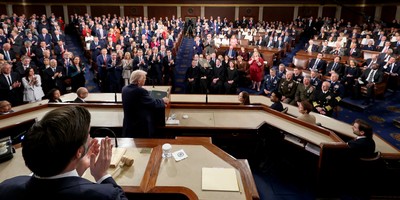Naturally I disagree with much of the opposition and my well-meaning colleagues on the left in regards to Keynes and his school of economics. Many in this school of thought cannot accept the fact that Keynesian economics has never worked; it did not work in the depression nor has it worked any time since then. The only time stimulus has "worked" is after the economy has already recovered and then becomes overheated by the stimulus. Keynesian economics is an excuse for politicians to buy off special interest and voters with other people's money. Let me address some of the opposition's specific points.
First, stimulus spending creates jobs. False: stimulus spending financed by taxes substitutes relatively inefficient government spending for private spending, in other words government spending "crowds out" private spending. The opposition may disagree that public spending is less efficient but the recent analysis of the government spending does not support their point of view.
Second, many will tell you that it is not taxation but debt that is financing the government spending; thus it is not crowding out private spending. I maintain that government debt crowds out private borrowing and investment. Many of my anti-capitalist colleagues say that government spending is not crowding out private investment because interest rates are low. Therefore there is plenty of money to finance private investment. Unfortunately, in an attempt to protect depositors, and the government guarantee of such deposits, the bank regulators have increased the credit underwriting requirements on banks. Consequently, they are not lending to small and medium sized businesses.
Interest rates are low because the Fed is printing money and as a result significantly increasing the money supply thereby making money less expensive. The irony of artificially low interest rates is that it reduces the income of pensioners and savers. This in effect shifts money and consumption from savers and transfers it to the government who is borrowing at artificially low rates.
Recommended
The business community realizes that the increased money supply is financing government spending and the private sector must eventually pay the piper. Consequently, the business community is not investing as much as it might because it is concerned about inflation and higher future taxes to pay for the borrowing. Since business investment takes time for a return, the business man making an investment now expecting a return 2 or 3 years from now knows that his taxes are going to be increased with the expiration of the Bush tax cuts and the 3.8% new Obama care tax on unearned earnings. Thus the businessman is not investing today because he knows his return is being significantly reduced 2 years from now.
Third, their argument of skyrocketing business investment is based on historically low investment in 2009 created by the worst recession since the Great Depression. Investors in 2011 are merely "catching up." Investment is not above the trend line.
Fourth, the left's idea to stimulate the economy through a tax credit for firms that increase employment shows a fundamental lack of understanding of why companies increase employment. Jobs are a by-product of increased sales and revenues. Companies do not like to hire employees. They are expensive, require management and cannot be easily laid off in the event of incompetence or loss of business. Companies increase employment because they have additional business that needs to be processed, and they cannot process it through overtime or increased capital. No businessman in his right mind would hire someone merely because labor is 10% cheaper because of tax credits. He would only increase employment if that is his only alternative to process additional business. If he has additional business, then he will hire additional employees regardless of the 10% credit. Therefore the credit is an inefficient way to increase employment and waste of taxpayer money.
Fifth, their plan for a serious budget reduction in the future does not work without a big initial down payment in spending cuts. Today's Congress cannot bind future congresses, and Congress has been notoriously unreliable with respect to the fiscal management of the country's finances. Only a naive observer of America's today's political environment could believe that congress will constrain spending to bring the deficit under control when the economy improves. The only point that the left may have is that fiscal stimulus may have a small temporary benefit when the money is originally spent, but the extent of the benefit depends on how the money is spent, e.g. infrastructure, tax rebates, government program, etc., and technical arguments about the multiplier effect of the spending. However, it has a negative impact when it is finally paid for.























Join the conversation as a VIP Member